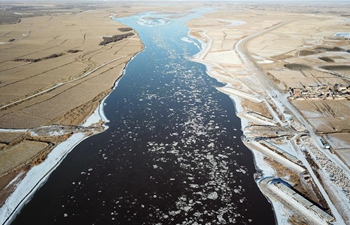CANBERRA, Jan. 11 (Xinhua) -- Leading Australian scientists on Thursday departed on a journey to launch deep-sea robots in the Southern Ocean to study the effects of climate change.
A team of researchers from the Commonwealth Scientific and Industrial Research Organisation (CSIRO) set sail on the research vessel Investigator on Thursday to deploy 11 deep-sea Argo floats near Antarctica.
The team of autonomous robots will provide scientists with year-round data from depths of up to 5,000 meters, 3,000 meters deeper than researchers have ever been in the Southern Ocean.
Steve Rintoul, Voyage Chief Scientist, said the data gathered would provide an insight into the southern hemisphere's ability to absorb heat and carbon dioxide.
"The world's climate is strongly influenced by the oceans, and the vast Southern Ocean plays a major role in how climate variability and change will play out in future decades," Rintoul said in a media release on Thursday.
"We already know that the Southern Ocean makes important contributions to global sea level change through taking up more heat than any other ocean on Earth and through influencing how fast the Antarctic Ice Sheet loses mass.
"To understand this system we need comprehensive and continuous measurements over a huge area of ocean, which has been very difficult in the past."
The 11 Argo model floats were supplied by research institute in the U.S., France and Japan.
"It's the first time these next-generation deep water Argo floats will be deployed near Antarctica. By providing year-round measurements through the full ocean depth, the floats will fill a massive data gap for the climate research community," Rintoul said.
The voyage will also be used by scientists from the CSIRO, Bureau of Meteorology (BoM) and the U.S. National Center for Atmospheric Research (NCAR) to study the interaction between aerosols and clouds.
"The Southern Ocean region is the cloudiest place on Earth, yet we don't understand why these clouds are different from clouds in other regions, the lack of pollution over this remote region is a possible explanation, which we will explore with these unprecedented observations," BoM Project Leader Alain Protat said.















